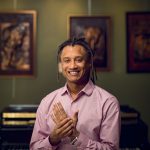

By: Gail Obenreder
“I strive to take the listener on a journey through the use of contrasting textures, layering colors and lines, like a painter layers pigment. I invite all aspects of my life to inform my compositions and my compositional process.”
Composer Jonathan W. Whitney is deeply committed to creating music that speaks both about and to his community. “Art can address social issues, express frustration, and bring about change,” but he knows that “it also brings joy, the highest form of protest against oppression.”
Whitney grew up in Newark, and his father – a professional drummer with an organ repair business – was his major early influence. Whitney began his musical life by “spending hours making up songs on the organ in our house” and playing along to the reel-to-reel recordings of his father’s band gigs. He continued formal music studies as an undergraduate at the University of Delaware, where his revered mentor was Vernon James, who taught him jazz standards and helped the young percussionist to get his first jazz gig.
After graduating from Delaware, Whitney became active in the Philadelphia jazz scene, getting a masters degree in Jazz Studies (at The University of the Arts) that allowed him to focus on composition. Merging jazz idioms with classical forms, he writes music that “acts as a skeleton, allowing for the full character to be realized in performance.” He’s studied many of the compositions of Wynton Marsalis, especially his use of counter melodies, and Whitney’s own study of counterpoint leads him toward compositions “crafted around melody, pushed by harmony, prodded by counter melody, but led by texture.”
“Bedtime,” 2019
Full length: 4 minutes 38 seconds
Work sample: 4 minutes 38 seconds
“See What is Good,” 2017
Full length: 6 minutes 12 seconds
Work sample: 4 minutes 59 seconds
His major challenge as a composer is working “at the intersection of jazz, classical music, funk, and music from across the African diaspora” to create works that blur the lines and “take the audience member somewhere.” Whitney admires a wide variety of composers that includes Brian Blade, Caroline Shaw, and Tyshawn Sorey, as well as artists like choreographer like Okwui Okpokwasili and painter Ellen Priest – people who push their art forms forward.
As well as enjoying family life with his wife and two daughters (who “keep my fire stoked when the fuel is running low”), Whitney is also a serious cook. And he often takes a break from his music by working on cars, even if it’s just replacing the brakes or changing the oil.
For this composer, “the Fellowship is going to be an artistic game changer.” He plans to record an album of his works, upgrade his computer, make demo files, and expand his writing for dance and for his ensemble, The Whitney Project. “I look forward to sharing the outcome of this year with our community!”
Artist website jwwmusic.com
Fellowship Home